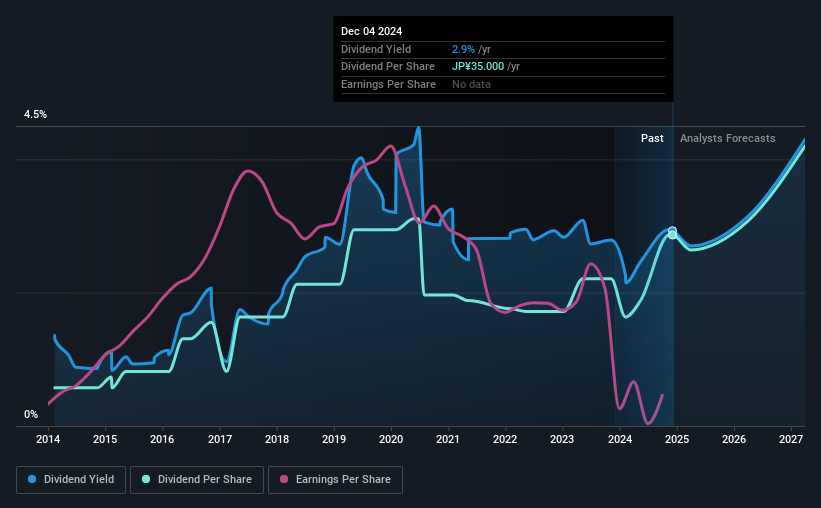
The board of Shimizu Corporation (TSE:1803) has announced that it will pay a dividend of ¥17.50 per share on the 30th of June. Based on this payment, the dividend yield for the company will be 2.9%, which is fairly typical for the industry.
View our latest analysis for Shimizu
Estimates Indicate Shimizu's Could Struggle to Maintain Dividend Payments In The Future
We aren't too impressed by dividend yields unless they can be sustained over time. Prior to this announcement, the company was paying out 147% of what it was earning. Without profits and cash flows increasing, it would be difficult for the company to continue paying the dividend at this level.
Earnings per share is forecast to rise by 26.8% over the next year. If the dividend continues on its recent course, the payout ratio in 12 months could be 185%, which is a bit high and could start applying pressure to the balance sheet.

Dividend Volatility
The company has a long dividend track record, but it doesn't look great with cuts in the past. The dividend has gone from an annual total of ¥7.00 in 2014 to the most recent total annual payment of ¥35.00. This means that it has been growing its distributions at 17% per annum over that time. Shimizu has grown distributions at a rapid rate despite cutting the dividend at least once in the past. Companies that cut once often cut again, so we would be cautious about buying this stock solely for the dividend income.
The Dividend Has Limited Growth Potential
Given that the dividend has been cut in the past, we need to check if earnings are growing and if that might lead to stronger dividends in the future. Shimizu's EPS has fallen by approximately 35% per year during the past five years. Dividend payments are likely to come under some pressure unless EPS can pull out of the nosedive it is in. It's not all bad news though, as the earnings are predicted to rise over the next 12 months - we would just be a bit cautious until this becomes a long term trend.
We're Not Big Fans Of Shimizu's Dividend
Overall, while the dividend being raised can be good, there are some concerns about its long term sustainability. The company's earnings aren't high enough to be making such big distributions, and it isn't backed up by strong growth or consistency either. Overall, the dividend is not reliable enough to make this a good income stock.
It's important to note that companies having a consistent dividend policy will generate greater investor confidence than those having an erratic one. However, there are other things to consider for investors when analysing stock performance. For example, we've identified 4 warning signs for Shimizu (1 makes us a bit uncomfortable!) that you should be aware of before investing. Is Shimizu not quite the opportunity you were looking for? Why not check out our selection of top dividend stocks.
If you're looking to trade Shimizu, open an account with the lowest-cost platform trusted by professionals, Interactive Brokers.
With clients in over 200 countries and territories, and access to 160 markets, IBKR lets you trade stocks, options, futures, forex, bonds and funds from a single integrated account.
Enjoy no hidden fees, no account minimums, and FX conversion rates as low as 0.03%, far better than what most brokers offer.
Sponsored ContentNew: Manage All Your Stock Portfolios in One Place
We've created the ultimate portfolio companion for stock investors, and it's free.
• Connect an unlimited number of Portfolios and see your total in one currency
• Be alerted to new Warning Signs or Risks via email or mobile
• Track the Fair Value of your stocks
Have feedback on this article? Concerned about the content? Get in touch with us directly. Alternatively, email editorial-team (at) simplywallst.com.
This article by Simply Wall St is general in nature. We provide commentary based on historical data and analyst forecasts only using an unbiased methodology and our articles are not intended to be financial advice. It does not constitute a recommendation to buy or sell any stock, and does not take account of your objectives, or your financial situation. We aim to bring you long-term focused analysis driven by fundamental data. Note that our analysis may not factor in the latest price-sensitive company announcements or qualitative material. Simply Wall St has no position in any stocks mentioned.
About TSE:1803
Shimizu
Engages in the construction, development, engineering, and life cycle valuation businesses in Japan and internationally.
Acceptable track record with mediocre balance sheet.
Similar Companies
Market Insights
Community Narratives



